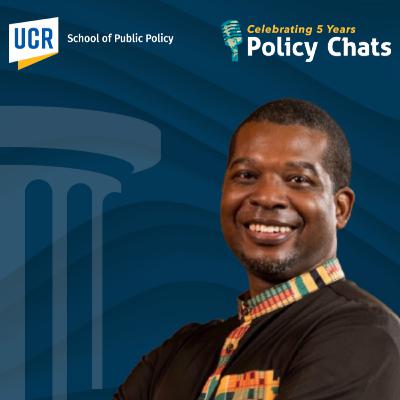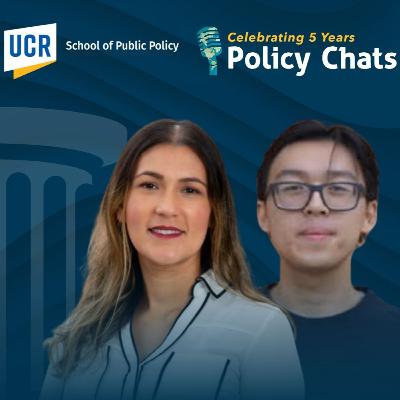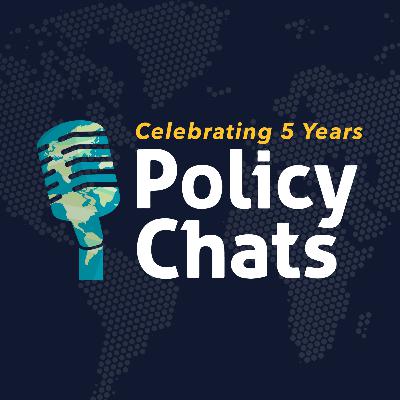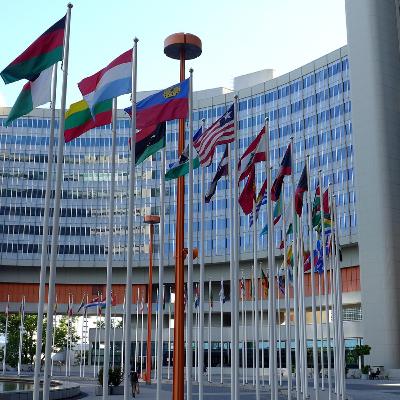Discover Policy Chats
Policy Chats

Policy Chats
Author: UCR School of Public Policy
Subscribed: 14Played: 113Subscribe
Share
© UCR School of Public Policy
Description
Join us for chats with various voices in the public policy world about today's most pressing societal issues. This podcast is a production of the School of Public Policy at the University of California, Riverside.
100 Episodes
Reverse
In this episode of Policy Chats, hosts Rachel Strausman and Dori Pham sit down with Assemblymember Corey Jackson of California’s 60th Assembly District. Together, they explore his journey from founding SBX Youth and Family Services to serving in the legislature, and how his lifelong commitment to uplifting vulnerable communities has shaped his approach to policymaking.From tackling the school to prison pipeline to championing affordable housing and advancing juvenile justice reform, this episode highlights the ways Assemblymember Jackson has worked to dismantle systemic inequities. He also reflects on the importance of building resilient communities through government and nonprofit collaboration, and why long term investment in people is key to breaking cycles of poverty and instability.This episode is not just a conversation, it is a call to reimagine how policy can better serve those most impacted by inequities. Tune in to hear how Assemblymember Jackson is working to create lasting change in California and beyond.Topics Covered:Assemblymember Jackson’s journey from student leader to legislatorFounding and growth of SBX Youth and Family ServicesThe school-to-prison pipeline and juvenile justice reformThe importance of sealing juvenile records for a fresh startCalifornia’s affordable housing crisis and social safety net programsHow government and nonprofits can build resilient communities📍 This episode is produced by the UCR School of Public Policy and features insights that align with our motto: “Solutions for the Region, Solutions for the World.”🎧 Guest Speaker:Assemblymember Corey Jackson, California State Assembly, District 60Interviewed by Rachel Strausman and Dori Pham, UCR Public Policy Students and hosts of Policy Chats🎵 Music by: Vir Sinha🔗 More on the UCR School of Public Policy: https://spp.ucr.edu/podcast📱 Follow us on Instagram: @ucr_spp👉 Subscribe so you don’t miss an episode and stay tuned for more conversations on the policies shaping our future!
In this episode of Policy Chats, host Dori Pham sits down with Assistant Director Marisol Torres and Policy Intern Germaine Ho from The Well, UC Riverside’s student health promotion department. Together, they explore the topic of menstrual equity, the challenges students face in accessing period products, and how policies are working to address period poverty on college campuses. From research-based policy briefs to creative programs like Flow Into Summer, this episode looks at how public health, education, and equity come together to make a difference. Additionally, Marisol and Germaine will discuss the barriers created by stigma, the difficulty of getting policies implemented effectively, and why collaboration between departments matters.This episode isn’t just a conversation—it’s a reminder that institutions have a responsibility to support their students in every way. Tune in to hear how advocacy, empathy, and education are helping to bring real change to UCR and beyond.Topics Covered:What is period poverty?How menstrual inequity impacts student wellbeingCurrent UC and CSU policies, including AB 367Data-driven approaches to policy writingInstitutional strategies to provide free menstrual productsThe importance of stigma reduction and faculty trainingVisions for a future of comprehensive menstrual access📍 This episode is produced by the UCR School of Public Policy and features research-informed insights that align with our motto: “Solutions for the Region, Solutions for the World.”🎧 Guest Speakers:Marisol Torres, Assistant Director at The WellGermaine Ho, Policy Intern at The WellInterviewed by Dori Pham, UCR Public Policy Student and incoming host of Policy Chats🎵 Music by: Vir Sinha🔗 More on the UCR School of Public Policy: https://spp.ucr.edu/podcast📱 Follow us on Instagram: @ucr_spp👉 Subscribe so you don’t miss an episode and stay tuned until the end for bonus reflections from the new host and ongoing research updates!
In this episode, Policy Chats hosts our second live podcast recording, featuring researchers, practitioners, and individuals with lived experiences discussing the current policies that shape reentry, higher education, and employment access post-incarceration. This panel was produced in collaboration with the UCR Presley Center for Crime and Justice Studies. Panelists include:Dr. Annika Anderson, CSUSB Project Rebound Executive Director/Principal InvestigatorPete Pridanonda, UCR Department of Economics Ph.D. CandidateSofia Alvarenga, CSUSB Project Rebound Outreach CoordinatorRyan Uribe, UCR School of Public Policy StudentLearn more about the Presley Center for Crime and Justice Studies via presleycenter.ucr.eduStay tuned until the end of the episode for bonus content featuring panelists' research, as well as a discussion with the incoming host of Policy Chats, Dori Pham!Interviewer:Rachel Strausman (UCR Public Policy Major, Dean’s Chief Ambassador)Music by: Vir SinhaCommercial Links:https://spp.ucr.edu/ba-mpphttps://spp.ucr.edu/mpp This is a production of the UCR School of Public Policy: https://spp.ucr.edu/ Subscribe to this podcast so you don’t miss an episode. Learn more about the series and other episodes via https://spp.ucr.edu/podcast.
In this episode, City of Redlands Councilmember Denise Davis, talks with students from the UC Riverside School of Public Policy about her work advancing equity, tackling homelessness, and building stronger, more connected communities at the local level.About Denise Davis:Denise Davis was elected in 2018, and is proudly the first openly LGBTQ Council Member in the City of Redlands. She served as Mayor Pro Tem from 2018-2020, running meetings in the Mayor’s absence, and sitting on a number of subcommittees including the budget subcommittee, the COVID-19 subcommittee, the City Manager Recruitment subcommittee, and has been a liaison to the Cultural Arts Commission, the Traffic and Parking Commission, the Historic and Scenic Preservation Commission, OmniTrans, SBCTA, and the Santa Ana River Conservancy Commission. Denise has also served as the City of Redlands voting delegate each year for the League of California Cities Annual Conference. Learn more about Denise Davis via https://www.linkedin.com/in/ddavis11Guest:Denise Davis (Councilmember, City of Redlands) Interviewer:Rachel Strausman (UCR Public Policy Major, Dean’s Chief Ambassador)Music by: Vir SinhaCommercial Links:https://spp.ucr.edu/ba-mpphttps://spp.ucr.edu/mpp This is a production of the UCR School of Public Policy: https://spp.ucr.edu/ Subscribe to this podcast so you don’t miss an episode. Learn more about the series and other episodes via https://spp.ucr.edu/podcast.
In this episode, Dr. Pierre Berastaín, the Centre for Public Impact's Regional Director for North America, talks with students from the UC Riverside School of Public Policy about his journey from Peru and his extensive work in addressing systemic challenges like immigration, gender-based violence prevention, and restorative justice.About Pierre Berastaín:Dr. Pierre R. Berastaín is a public health leader and advocate with academic degrees in Social Anthropology, Divinity, and Public Health from Harvard and UNC-Chapel Hill. He co-founded Caminar Latino – Latinos United for Peace and Equity, a national organization supporting Latino families affected by domestic violence, and has held leadership roles in several organizations focused on gender-based violence, including Harvard’s Office of Sexual Assault Prevention and Response. Pierre has led federal grant programs, trained nationally and internationally, and advanced culturally competent approaches to violence prevention. Originally from Peru, he now lives in Washington, DC with his husband and has been recognized among Boston’s Top 25 Most Influential LGBTQ People of Color.Learn more about Pierre Berastaín via https://centreforpublicimpact.org/team/pierre-r-berastain/Guest:Pierre Berastaín (Regional Director for North America, Centre for Public Impact) Interviewers:Rachel Strausman (UCR Public Policy Major, Dean’s Chief Ambassador)Liam Burley (UCR Public Policy Major, Dean’s Ambassador) Music by: Vir SinhaCommercial Links:https://spp.ucr.edu/ba-mpphttps://spp.ucr.edu/mpp This is a production of the UCR School of Public Policy: https://spp.ucr.edu/ Subscribe to this podcast so you don’t miss an episode. Learn more about the series and other episodes via https://spp.ucr.edu/podcast.
In this episode, Deb Aikat, University of North Carolina Professor of Journalism and Media, talks with the UC Riverside School of Public Policy about how technology impacts government processes and media communication. They discuss the media's crucial role during the pandemic and emphasize the importance of providing balanced news to support a healthy democracy. This is the seventh episode in our 11-part series, Technology vs. Government, featuring former California State Assemblymember Lloyd Levine.About Deb Aikat:A former journalist, Deb Aikat has served as a faculty member in UNC-Chapel Hill’s Hussman School of Journalism and Media since 1995. Aikat’s peers elected him to lead as the 2023 President of the Association for Education in Journalism and Mass Communication (AEJMC), the premier 112-year-old scholarly organization with members in 43 countries across six continents. An award-winning scholar, Aikat theorizes the role of media platforms in two democratic societies, India, the largest democracy of 1.4 billion people, and the United States, one of the oldest modern democracies. By integrating news agenda-setting and agenda melding concepts, Aikat has theorized how media platforms in India and the U.S. are empowering people to protest, publish and provoke ideas through media platforms devoid of government control.Learn more about Deb Aikat via https://hussman.unc.edu/people/deb-aikatInterviewers:Lloyd Levine (Former California State Assemblymember, UCR School of Public Policy Senior Policy Fellow)Rachel Strausman (UCR Public Policy Major, Dean’s Chief Ambassador)Music by: Vir SinhaCommercial Links:https://myadv.ucr.edu/forms/spp-neumannhttps://spp.ucr.edu/ba-mpphttps://spp.ucr.edu/mpp This is a production of the UCR School of Public Policy: https://spp.ucr.edu/ Subscribe to this podcast so you don’t miss an episode. Learn more about the series and other episodes via https://spp.ucr.edu/podcast.
In this episode, Cara Chiaraluce, Santa Clara University Professor of Sociology, talks with the UC Riverside School of Public Policy about the impact of internet access on health outcomes. This is the sixth episode in our 11-part series, Technology vs. Government, featuring former California State Assemblymember Lloyd Levine.
About Cara Chiaraluce:
Cara Chiaraluce specializes in the fields of carework, gender and family, and health. Chiaraluce has published articles in the Journal of Family Issues, American Behavioral Scientist, and her forthcoming book Becoming an Expert Caregiver: How Structural Flaws Shape Autism Carework and Community (Rutgers University Press, 2024) examines the process through which lay women become expert caregivers to provide the best care for their children. Prior to joining the department in 2015, she taught Sociology at UC Davis (where she won the 2013 "Excellence in Undergraduate Education Award") and California State University- Sacramento. Chiaraluce is originally from Boston, Massachusetts, received her B.A. in Sociology from Assumption College, and M.A. and Ph.D. from UC Davis.
Learn more about Cara Chiaraluce via https://www.scu.edu/cas/sociology/faculty-and-staff/cara-chiaraluce/
Interviewer:
Lloyd Levine (Former California State Assemblymember, UCR School of Public Policy Senior Policy Fellow)
Music by: Vir Sinha
Commercial Links:
https://spp.ucr.edu/ba-mpp
https://spp.ucr.edu/mpp
This is a production of the UCR School of Public Policy: https://spp.ucr.edu/
Subscribe to this podcast so you don’t miss an episode. Learn more about the series and other episodes via https://spp.ucr.edu/podcast.
This week, we’re revisiting one of our favorite episodes from last year! In this episode, AllSides Co-Founder and CEO John Gable talks with students from the UC Riverside School of Public Policy about how understanding media bias and filter bubbles can help better bridge gaps amongst political polarization.
Thank you so much to our generous sponsor for this episode, the Wall Street Journal. Activate your free school-sponsored subscription today at: WSJ.com/UCRiverside
About John Gable:
John Gable received his B.A. in Philosophy, with an emphasis in Mathematics, from Vanderbilt University as well as Masters of Business Administration from Duke University. He has worked in a variety of fields, having previously been an Executive Director for various political campaigns, a Product Manager at Microsoft, the President of Stearns Ventures, and now the Co-Founder and CEO of AllSides. Overall, John Gable is a high technology executive focused on building, marketing and monetizing products, online services and teams that have a positive social impact.
Learn more about John Gable via https://www.allsides.com/news-source/john-gable
Podcast Highlights:
"The medium, the content, and the way we interact is driven a little bit by the medium itself. And what I thought about the internet was that it was mostly by metaphor: this is similar to that, and therefore you're a friend of a friend or I'm searching for something similar to what I'm trying to solve. I thought it would encourage us to think by metaphor or if you will, [in the extreme sense] stereotype."
- John Gable on the topic of how the internet is structured to make connections, which can initially be beneficial, but can also lead to dangerous steryotypes.
"[With the way the internet works] we see an issue, and we only hear or get information that we already agree with, which might only be 10% of what we need to know about an issue. But we hear that 10,000 times, and so we're really absolutely confident with no doubt that we're correct. But we know less about the issue than we did before the Internet.”
- John Gable on the topic of how filter bubbles can limit our access to necessary information, despite the increased access to information the internet seems to provide.
“[What we need to do is] get people out of the information filter bubble. Get them out of the relationship filter bubble, and provide people the skills and confidence to disagree, to have a conversation and not agree with each other and recognize the differences and appreciate the differences that each of us bring to the table. With that, that's how it would get to a better place.”
- John Gable on the topic of how teaching people to understand the value in disagreement can help people be more aware of filter bubbles.
Guest:
John Gable (Co-Founder and CEO of AllSides)
Interviewers:
Rachel Strausman (UCR Public Policy Major, Dean’s Chief Ambassador)
Divya Bharadwaj (UCR Public Policy Major, Dean’s Ambassador)
Music by: Vir Sinha
Commercial Links:https://spp.ucr.edu/ba-mpp
https://spp.ucr.edu/mpp
This is a production of the UCR School of Public Policy: https://spp.ucr.edu/
Subscribe to this podcast so you don’t miss an episode. Learn more about the series and other episodes via https://spp.ucr.edu/podcast.
In this episode, Juliana Maria Trammel, Associate Professor of Journalism & Mass Communications and Laura Robinson, Professor of Sociology talk with the UC Riverside School of Public Policy about the challenges and vulnerabilities with delivering information and services using eGovernment. This is the fifth episode in our 11-part series, Technology vs. Government, featuring former California State Assemblymember Lloyd Levine.Thank you so much to our generous sponsor for this episode, the Wall Street Journal. Activate your free school-sponsored subscription today at:WSJ.com/UCRiversideAbout Juliana Maria Trammel:Dr. Juliana Maria Trammel is a communications consultant, professor, and researcher. She has 12 years of experience in the field of communications that includes journalism, public relations, organizational and strategic communication, and communications research. She is currently an associate professor of Journalism & Mass Communications at Savannah State University. She earned a Ph.D. in Communication and Culture (organizational communication) from Howard University; a MA in Public Communication (social marketing) from American University; and a BA in Print and Broadcast Journalism (double major) from Rust College.Learn more about Juliana Maria Trammel via https://www.savannahstate.edu/class/departments/mass-communications/juliana-trammel.shtmlAbout Laura Robinson:Laura Robinson specializes in digital sociology, research methods, and global media in Brazil, France, and the U.S. Robinson’s work has appeared in journals including Information, Communication and Society; New Media & Society; Sociology, and Sociological Methodology. Robinson earned her Ph.D. from UCLA, where she held a Mellon Fellowship in Latin American Studies and received a Bourse d’Accueil at the École Normale Supérieure. She also earned degrees from Université Sorbonne Nouvelle - Paris 3 and USC. Leadership to the discipline has included serving as CITAMS Section Chair and as a member of the ASA Committee on the Status of Persons with Disabilities in Sociology.Learn more about Laura Robinson via https://www.scu.edu/cas/sociology/faculty-and-staff/laura-robinson/Interviewers:Lloyd Levine (Former California State Assemblymember, UCR School of Public Policy Senior Policy Fellow)Dinara Godage (UCR Public Policy Major, Dean’s Ambassador)Music by: Vir SinhaCommercial Links:https://spp.ucr.edu/ba-mpphttps://spp.ucr.edu/mpp This is a production of the UCR School of Public Policy: https://spp.ucr.edu/ Subscribe to this podcast so you don’t miss an episode. Learn more about the series and other episodes via https://spp.ucr.edu/podcast.
In this episode, CEO of Feeding America Riverside | San Bernardino, Carolyn Fajardo talks with the UC Riverside School of Public Policy about modern approaches to food insecurity and long-term, sustainable solutions. Thank you so much to our generous sponsor for this episode, the Wall Street Journal. Activate your free school-sponsored subscription today at: WSJ.com/UCRiverside
About Carolyn Fajardo:
Carolyn Fajardo, born Carolyn Solar, is a Latina and the first in her family to earn a bachelor's degree. She graduated from California State University, San Bernardino, with a BA in Communications and began her career in food banking as the Marketing and Communications Coordinator for FARSB. She later pursued her MBA at California Baptist University while advancing to the role of Development Director. Later, she was appointed CEO.
Learn more about Carolyn Fajardo via https://www.linkedin.com/in/carolynfajardo/
Interviewer:
Rachel Strausman (UCR Public Policy Major, Dean’s Chief Ambassador)
Dori Pham (UCR Public Policy Major, Dean’s Ambassador)
Music by: Vir Sinha
This is a production of the UCR School of Public Policy: https://spp.ucr.edu/
Subscribe to this podcast so you don’t miss an episode. Learn more about the series and other episodes via https://spp.ucr.edu/podcast.
In this episode, Catherine Sandoval, Santa Clara University Law Professor and Patrick Lanthier, co-founder of RIVERA/LANTHIER & Associates talk with the UC Riverside School of Public Policy about how social vulnerabilities and the digital divide shape disaster response outcomes. This is the fourth episode in our 11-part series, Technology vs. Government, featuring former California State Assemblymember Lloyd Levine.
Thank you so much to our generous sponsor for this episode, the Wall Street Journal. Activate your free school-sponsored subscription today at: WSJ.com/UCRiverside
About Catherine Sandoval:
Catherine Sandoval is a tenured Law Professor at Santa Clara University, specializing in Communications and Energy law. She served in the US federal government as a Presidential-nominated, Senate Confirmed Board Member of the US Chemical Safety Board, and as Director of the FCC Office of Communications Business Opportunities. California Governors Brown and Davis appointed her as Commissioner of the California Public Utilities Commission, and Undersecretary of California’s Business, Transportation, and Housing Agency, She earned a B.A. from Yale University, a Master of Letters from Oxford University where she was a Rhodes Scholar, and a J.D. from Stanford Law School.
Learn more about Catherine Sandoval via
https://www.linkedin.com/in/catherine-sandoval-7a2a2416a/
About Patrick Lanthier:
Patrick Lanthier co-founded RIVERA/LANTHIER & Associates, a Silicon Valley-based technology and policy firm in 1997. At AT&T & BELL Labs, he was on early Cellular, Internet, and National Security & Emergency Preparedness teams. He co-founded New Ventures (total $1B) and advises 22 countries’ Emergency Communications Planners, the United Nations, the European Union, and the US Departments of Defense, Homeland Security, Justice, and State. He advised at Carnegie Mellon University, Santa Clara University, and both California’s Emerging Technology Fund and its Office of Emergency Services. He has led teams in more than 50 countries. His education includes California Polytechnic, San Francisco State, Golden Gate, Seton Hall, and The Wharton School. He testified in the US Congress and other venues.
Learn more about Patrick Lanthier via
https://www.linkedin.com/in/patrick-lanthier-6ba8068/
Interviewers:
Lloyd Levine (Former California State Assemblymember, UCR School of Public Policy Senior Policy Fellow)
Rachel Strausman (UCR Public Policy Major, Dean’s Chief Ambassador)
Music by: Vir Sinha
Commercial Links:
https://spp.ucr.edu/ba-mpp
https://spp.ucr.edu/mpp
This is a production of the UCR School of Public Policy: https://spp.ucr.edu/
Subscribe to this podcast so you don’t miss an episode. Learn more about the series and other episodes via https://spp.ucr.edu/podcast.
In this episode, President of Cover My Mental Health, Joe Feldman talks with the UC Riverside School of Public Policy about policies addressing mental health care parity and the role of employers in improving access to care.Thank you so much to our generous sponsor for this episode, the Wall Street Journal. Activate your free school-sponsored subscription today at: WSJ.com/UCRiverside
About Joe Feldman:
Founder Joe Feldman began advocating for access to mental health care after overcoming denials for a family member’s care, including with a successful federal lawsuit. His advocacy work has included policy-driven discussions with legislators and regulators, a board role with The Kennedy Forum Illinois, presentations to parent groups, and publication of actionable guidance such as a 2021 article in the Journal of Psychiatric Practice on medical necessity letters.
Learn more about Joe Feldman via https://www.linkedin.com/in/josephmfeldman
Interviewer:
Rachel Strausman (UCR Public Policy Major, Dean’s Chief Ambassador)
Music by: Vir Sinha
This is a production of the UCR School of Public Policy: https://spp.ucr.edu/
Subscribe to this podcast so you don’t miss an episode. Learn more about the series and other episodes via https://spp.ucr.edu/podcast.
In this episode, Noah McClain, Assistant Professor of Sociology talks with the UC Riverside School of Public Policy about security and technology vulnerabilities within New York's Metropolitan Transportation Authority. This is the third episode in our 11-part series, Technology vs. Government, featuring former California State Assemblymember Lloyd Levine.
Thank you so much to our generous sponsor for this episode, the Wall Street Journal. Activate your free school-sponsored subscription today at: WSJ.com/UCRiverside
About Noah McClain:
Noah McClain (PhD, New York University) is a sociologist with interests spanning the sociologies of cities, law, inequality, complex organizations, work, policing, and security, and how these intersect with technologies high and low. Dr. McClain has published a broad range of articles dealing with these topics in venues such as the Journal of Consumer Culture, Poetics, and Information, Communication, and Society. He has served on the faculties of Illinois Tech, and the Bard Prison Initiative, where he was also a postdoctoral research fellow. He is also a former investigator of police misconduct for the City of New York.
Learn more about Noah McClain via https://www.linkedin.com/in/noah-mcclain-2b415769
Interviewer:
Lloyd Levine (Former California State Assemblymember, UCR School of Public Policy Senior Policy Fellow)
Watch the video version of this episode via: https://youtu.be/kKr6yODUQGQ
Music by: Vir Sinha
Commercial Links:
https://spp.ucr.edu/ba-mpp
https://spp.ucr.edu/mpp
This is a production of the UCR School of Public Policy: https://spp.ucr.edu/
Subscribe to this podcast so you don’t miss an episode. Learn more about the series and other episodes via https://spp.ucr.edu/podcast.
In this episode, Director of Mapping Black California, Candice Mays talks with the UC Riverside School of Public Policy about the availability of comprehensive data, how gaps in population data impact policy, and the critical role data plays in shaping informed, equitable policies.
Thank you so much to our generous sponsor for this episode, the Wall Street Journal. Activate your free school-sponsored subscription today at: WSJ.com/UCRiverside
About Candice Mays:
Candice Mays serves as Mapping Black California’s Project Director. Alongside a diverse professional background in grassroots nonprofit organization management, development, and grant making, she spent three years as a literacy teacher with the New York City Department of Education after receiving her M.A. in English Education from New York University. Her time as a public school educator inspired her pursuit of an M.F.A. in Creative Writing, Fiction at the University of Miami where was a Michener Teaching Fellow and a M.F.A. Summer Award winner. Her research experience includes conducting cultural and historical analysis of Louisiana Creoles reflecting the content of her fiction which critically examines multi-cultural, African American existence in non-inclusive spaces. Having returned to Southern California and her beloved Riverside County, Candice seeks to humanize GIS by mining narratives from data on all things historical, Californian, and most importantly, Black.
Learn more about Candice Mays via https://www.linkedin.com/in/candice-mays-a7382b8
Interviewer:
Rachel Strausman (UCR Public Policy Major, Dean’s Chief Ambassador)
Music by: Vir Sinha
This is a production of the UCR School of Public Policy: https://spp.ucr.edu/
Subscribe to this podcast so you don’t miss an episode. Learn more about the series and other episodes via https://spp.ucr.edu/podcast.
In this episode, John Thomas Flynn, Former CIO for the States of California and Massachusetts talks with the UC Riverside School of Public Policy about government's current challenges regarding technology implementation and utilization. This is the second episode in our 11-part series, Technology vs. Government, featuring former California State Assemblymember Lloyd Levine.
Thank you so much to our generous sponsor for this episode, the Wall Street Journal. Activate your free school-sponsored subscription today at: WSJ.com/UCRiverside
About John Thomas Flynn:
John Thomas Flynn is MeriTalk’s Senior Advisor for Government Programs. He was the first Chief Information Officer for both the State of California and the Commonwealth of Massachusetts, and was president of the National Association of State Chief Information Officers (NASCIO). He was also a White House appointee in the Reagan and G.H.W. Bush administrations.
Learn more about John Thomas Flynn via https://www.linkedin.com/in/jtflynn/details/experience/
Interviewer:
Lloyd Levine (Former California State Assemblymember, UCR School of Public Policy Senior Policy Fellow)
Music by: Vir Sinha
Commercial Links:
https://spp.ucr.edu/ba-mpp
https://spp.ucr.edu/mpp
This is a production of the UCR School of Public Policy: https://spp.ucr.edu/
Subscribe to this podcast so you don’t miss an episode. Learn more about the series and other episodes via https://spp.ucr.edu/podcast.
In this episode, Author of Recoding America, Jennifer Pahlka, talks with the UC Riverside School of Public Policy about government's current challenges regarding technology implementation and utilization. This is the first episode in our 11-part series, Technology vs. Government, featuring former California State Assemblymember Lloyd Levine.
Thank you so much to our generous sponsor for this episode, the Wall Street Journal. Activate your free school-sponsored subscription today at: WSJ.com/UCRiverside
About Jennifer Pahlka:
Jennifer Pahlka is a senior fellow at the Niskanen Center and the Federation of American Scientists and a senior advisor to the Abundance Network. She founded Code for America in 2010 and led the organization for ten years. In 2013, she took a leave of absence to serve as U.S. Deputy Chief Technology Officer under President Obama and helped found the U.S. Digital Service. She served on the Defense Innovation Board, started by the late Ash Carter, under Presidents Obama and Trump. At the start of the pandemic, she also co-founded U.S. Digital Response, which helps government meet the needs of the public with volunteer tech support. She has received the Skoll Award for Social Entrepreneurship, and was named by Wired as one of the 25 people who has most shaped the past 25 years. She serves on the boards of US Digital Response, America’s Frontier Fund, and the Volcker Alliance.
Learn more about Jennifer Pahlka via https://www.jenniferpahlka.com/
Interviewers:
Lloyd Levine (Former California State Assemblymember, UCR School of Public Policy Senior Policy Fellow)
Rachel Strausman (UCR Public Policy Major, Dean’s Chief Ambassador)
LINK YOUTUBE-ANCHORMusic by: Vir SinhaCommercial Links:https://spp.ucr.edu/ba-mpp
https://spp.ucr.edu/mpp
This is a production of the UCR School of Public Policy: https://spp.ucr.edu/
Subscribe to this podcast so you don’t miss an episode. Learn more about the series and other episodes via https://spp.ucr.edu/podcast.
In this episode, Founder and Executive Director of the Women's Earth and Climate Action Network (WECAN), Osprey Orielle Lake, talks with the UC Riverside School of Public Policy about shifting the narrative on international climate justice using a feminist lens.
Thank you so much to our generous sponsor for this episode, the Wall Street Journal. Activate your free school-sponsored subscription today at: WSJ.com/UCRiverside
About Osprey Orielle Lake:
Osprey Orielle Lake is the Founder and Executive Director of the Women's Earth and Climate Action Network (WECAN) International, working nationally and internationally with grassroots and frontline women leaders, policy-makers, and diverse coalitions to build women's leadership, climate justice, resilient communities, and a just transition to a decentralized, democratized clean energy future. Osprey is the Co-Director of the Indigenous Women's Divestment Delegations, and actively leads WECAN International's projects — from various trainings and work to shift the narrative on climate justice using a feminist lens, to engagements at United Nations climate conferences — from frontline delegations, to campaigns such as the 'Women for Forests' program. Osprey was the visionary behind the International Women’s Earth and Climate Summit, which brought together 100 global women leaders to draft and implement a 'Women’s Climate Action Agenda', and co-founded the International Women’s Earth and Climate Initiative (IWECI), the precursor initiative of WECAN International.
Learn more about Osprey Orielle Lake via https://www.linkedin.com/in/osprey-orielle-lake-4286bb12
Interviewer:
Rachel Strausman (UCR Public Policy Major, Dean’s Chief Ambassador)
Watch the video version via: https://youtu.be/c1TtUF1lm3E
Music by: Vir Sinha
This is a production of the UCR School of Public Policy: https://spp.ucr.edu/
Subscribe to this podcast so you don’t miss an episode. Learn more about the series and other episodes via https://spp.ucr.edu/podcast.
In this episode, Executive Director of the Western Riverside Council of Governments Kurt Wilson talks with students from the UC Riverside School of Public Policy about community development, disproportionate minority contact deficiencies within the criminal legal system, and regional governance and collaboration.
About Kurt Wilson:
Dr. Kurt Wilson serves as the Executive Director of the Western Riverside Council of Governments (WRCOG), bringing over 25 years of local government leadership experience. A native of the Inland Empire, Dr. Wilson has held senior management roles in five cities across the West Coast and served in both state and federal capacities, including two gubernatorial appointments from former California Governor Arnold Schwarzenegger. His career highlights include guiding the City of Stockton through a financial recovery from bankruptcy to becoming one of the most fiscally healthy large cities in the U.S. Dr. Wilson is also an educator, teaching courses in public policy and government operations, and has held leadership roles such as Vice President of the California affiliate of the International City and County Management Association.
Learn more about Kurt Wilson via https://www.linkedin.com/in/kurt-wilson/
Podcast Highlights:
"There was a time in our history... that once someone is convicted of doing something, we sort of throw them away... and then when they come out, having been in that environment, we're somehow surprised that things didn't get better."
- Kurt Wilson on the topic of the evolution of reintegration processes into society, post-incarceration.
"A lot of equity efforts fail because they're presented in a way where there's a clear winner and subsequently a clear loser. The person who feels as if they're being attacked, or that they're likely to lose is inherently going to push back. We see that in issues of race, we see that in issues of policing, all of our social issues, it's a very similar theme where we're not starting from the same place. By understanding that from the get-go, you're able to come up with some concepts to make a little bit more sense."
- Kurt Wilson on the topic of equity efforts and how framing can affect public perception of key issues.
Guest:
Kurt Wilson (Executive Director, Western Riverside Council of Governments)
Interviewers:
Rachel Strausman (UCR Public Policy Major, Dean’s Chief Ambassador)
Esa Hasan (UCR Public Policy Major, Dean’s Ambassador)
Music by: C Codainehttps://freemusicarchive.org/music/Xylo-Ziko/Minimal_1625https://freemusicarchive.org/music/Xylo-Ziko/PhaseCommercial Links:https://spp.ucr.edu/ba-mpphttps://spp.ucr.edu/mpp
This is a production of the UCR School of Public Policy: https://spp.ucr.edu/
Subscribe to this podcast so you don’t miss an episode. Learn more about the series and other episodes via https://spp.ucr.edu/podcast.
In this episode, United Nations Senior Policy Advisor Manav Sachdeva talks with students from the UC Riverside School of Public Policy about his insights from his decorated career in international policy and how he works to help countries navigate from conflict to stability.
About Manav Sachdeva:
Manav Sachdeva is a senior policy advisor and emergency expert personnel deployed at short notice for the United Nations Development Programme. He has worked for the UN and UNDP in several capacities since 2007 including as programme specialist for Asia Pacific and Arab States, Development consultant, senior advisor to Afghanistan UNWOMEN, and as a proposal writing consultant for UNDP Somalia. Manav’s cross-border cooperation and peace/stabilization missions have included, Afghanistan, India, Lebanon, Ukraine, Kyrgyzstan, Guyana, Liberia, and Kosovo. He holds a graduate degree in Economic Development and State/Society structural relations from Columbia University and academic research experience with Harvard University.
Podcast Highlights:
“The more you get knowledge of places on the ground, [and] the more you [hear] the stories about them, [you learn that they don't] have control over their own narrative... they have a whole set of issues that have not been listened to."
- Manav Sachedva on the topic of the importance of giving people the space to tell their own stories so they can advocate for what their communities need, especially in the Global South.
“There are layers of suffering and we need to... listen. So the main thing I find in transition [from conflict to stability] is the mistakes we make when we don't listen…there is a cost to not listen in this line of work”
- Manav Sachedva on the topic of the importance of intentionality and learning from the locals when helping areas transition from times of conflict to stability.
“We did a project and we dug a well where we didn't even check if the ground were levels were good enough - people do silly things out of hubris. So, check yourself a little bit because if you do it with humility you will have such a happy life."
- Manav Sachedva on a project he worked on in Afghanistan and the value of maintaining humility when trying to help others.
Guest:
Manav Sachdeva (United Nations Senior Policy Advisor)
Interviewers:
Rachel Strausman (UCR Public Policy Major, Dean’s Vice Chief Ambassador)
Dinara Godage (UCR Public Policy Major, Dean’s Ambassador)
Music by: C Codaine
https://freemusicarchive.org/music/Xylo-Ziko/Minimal_1625https://freemusicarchive.org/music/Xylo-Ziko/Phase
Commercial Links:
https://spp.ucr.edu/ba-mpphttps://spp.ucr.edu/mpp
This is a production of the UCR School of Public Policy: https://spp.ucr.edu/
Subscribe to this podcast so you don’t miss an episode. Learn more about the series and other episodes via https://spp.ucr.edu/podcast.
In this episode, Judge Magdalena Cohen, Jennifer Bender, Eric Stopher, Deborah Johnson, and Dr. Stephanie Brooks Holliday talk with students from the UC Riverside School of Public Policy about the Community Assistance, Recovery, and Empowerment (or CARE) Act and the intersection of mental health and criminal justice in California.
Podcast Highlights:
“We do what we can to make sure that coming out of an inpatient setting, that person is prioritized, to receive the services that they need, including medication. We have a whole host of outpatient clinics from the city of Riverside all the way to Blythe, and so really we try to work with that individual to provide them with the best of their needs. And it's individualized, whatever it's going to take… to keep that person stable in the community.”
- Deborah Johnson on the topic of ensuring that care is provided to individuals beyond hospitalization, helping ease them with their transition.
“It's a policy thing that has to be looked at, is how are we going to plan for those housing issues [that are so prevalent in California], not only in Care Courts, but in any other program that the state wants to have the counties look at, and even with LPS. And I think that that's not a problem, but something that Riverside is not unique to, but it's certainly more unique than some of the other larger counties in California.”
- Eric Stopher on the topic of how Riverside County is preparing to provide housing amidst a state housing shortage.
“Even though there are a range of services available, some of the limiting factors are having enough providers to be able to offer services to everyone who might need [them]. There's a lot of variation from county to county with respect to the resources that are available, meaning that a lot of times it feels like access to mental health services can really be determined by the zip code that you live in.”
- Dr. Stephanie Brooks Holliday on the topic of geographic barriers to resources.
Guests:
Judge Magdalena Cohen (Judge, Riverside Superior Court)
Jennifer Bender (Deputy Public Defender, Riverside County Public Defender’s Office)
Eric Stopher (Deputy County Counsel, County of Riverside)
Deborah Johnson (Director of Innovation/Integration, Riverside University Health System - Behavioral Health)
Dr. Stephanie Brooks Holliday (Senior Behavioral Scientist; Professor of Policy Analysis, Pardee RAND Graduate School)
Interviewer:
Rachel Strausman (UCR Public Policy Major, Dean’s Vice Chief Ambassador)
Music by: C Codainehttps://freemusicarchive.org/music/Xylo-Ziko/Minimal_1625https://freemusicarchive.org/music/Xylo-Ziko/PhaseCommercial Links:spp-ikhrata.eventbrite.com
bit.ly/spp-ikhratahttps://spp.ucr.edu/ba-mpp
https://spp.ucr.edu/mpp
This is a production of the UCR School of Public Policy: https://spp.ucr.edu/ Subscribe to this podcast so you don’t miss an episode. Learn more about the series and other episodes via https://spp.ucr.edu/podcast.
























